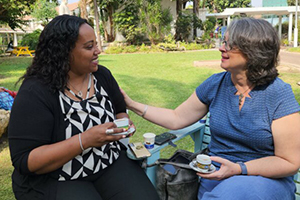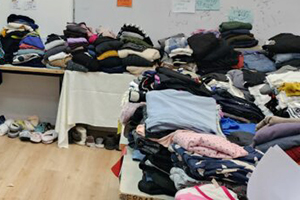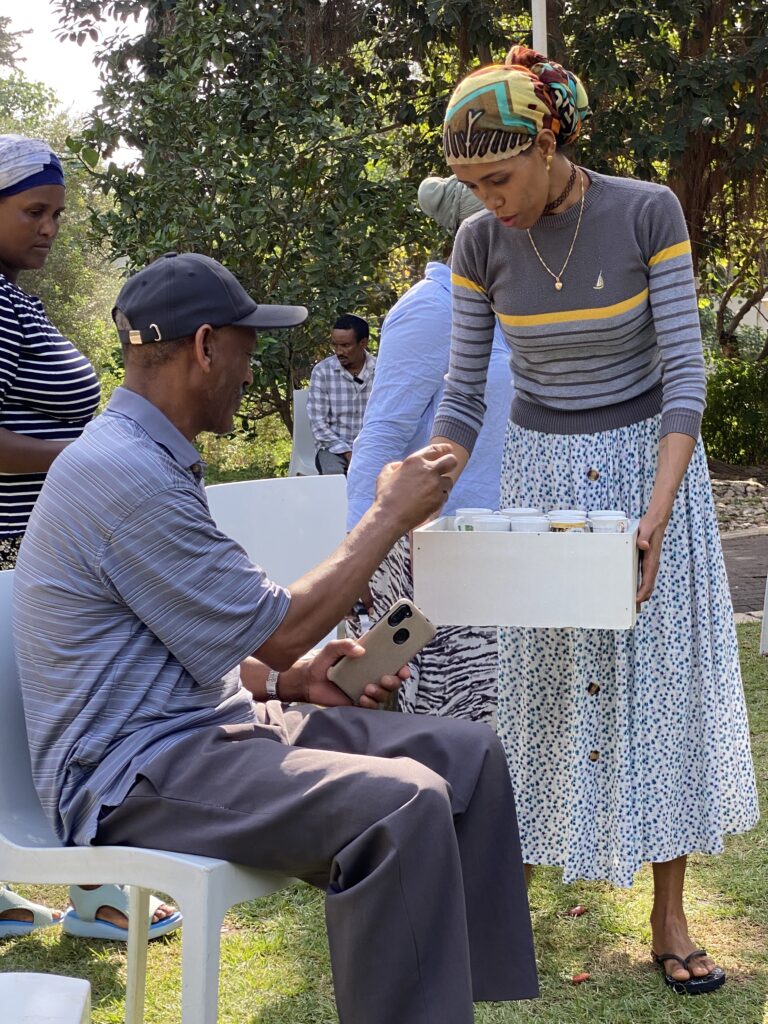
Helping Ethiopian Immigrants Evacuated under Fire

Despite the pastoral surroundings and children playing peacefully nearby, the chaos and fear generated by the terrorist attack on Israel on October 7 were conveyed in a waterfall of words by my new friend, Aviva, the director of the Barnea Ashkelon Aliyah center. We could hear the Israeli Air Force (IAF) jets flying overhead as we sat together on a bench outside the hotel where she and 130 Ethiopian immigrants were evacuated to in the north. Yet our surroundings felt serene as the Ethiopian families enjoyed the quiet—and hospitably included us in their traditional “buna” coffee time.
“I live about 10 minutes away, and arriving at the Aliyah center that fatal Shabbat morning was the most frightening trip I’ve ever made in my life,” shared Aviva. “Traffic lights weren’t working and electricity lines were down on the roads. I arrived at 7:00 a.m., shortly after the attack began, to find chaos. The immigrants, most of whom are religious, were on their way to prayers when the red alert sounded, and they were very afraid and confused. I knew I couldn’t get control of the situation by myself, so I asked some of the young soldiers home on leave to get into uniform and help me create order.”
On the second day of the war, the 400-plus Ethiopian immigrants from the center were assigned secure locations in the North. The ongoing rocket fire made the operation difficult and complex with potentially lethal shrapnel falling on the center and red alert sirens sounding often.
“We divided everyone into bomb shelters, then brought the buses inside the Aliyah center to be loaded one at a time, and they left immediately. It took two days to get everyone out. As each bus left, there was concern for their safety. I was completely focused on the task at hand, yet, on a personal level, I left my children alone at home. There was fear of terrorists invading the area. This was a terrifying new reality we had never experienced before,” recounted Aviva.
“Once everyone was evacuated and I made sure they were safe, I finally had time to think about myself and my family. I live in southern Ashkelon, so we could hear all the shots being fired—both by the IDF and the terrorists. We heard that some terrorists were near our neighborhood, and my parents are still there. Think about how many things I had to deal with all at once. I haven’t been able to breathe for two weeks. It is as if something inside is blocked … I can’t catch my breath,” she continued.
“Aviva, you are a real heroine!” I exclaimed, trying to imagine her ordeal. Her response made us both smile.
“Yes. I am! Today I can allow myself to say so!”
Giving her a spontaneous hug of support, I asked, “How are you today? Do you have what you need?”
“We are now more than 15 days in the North. It’s very tough because we don’t know when we will return or how long we will be here. People came with very little,” she explained. “Many immigrants are concerned that they can’t work, and they have bills to pay.”

Thankfully, good people are constantly bringing urgently needed clothing, toiletries, toys and activities for children, and help for whatever else is needed. Local Ethiopian Jews brought customary dresses for the women and traditional foods, such as injera and dabbo, for the older ones to enjoy and feel at home.
These Ethiopian immigrants arrived in Israel as little as six months ago. Aviva noted that many, especially the elderly, do not speak Hebrew yet, so they rely on interpreters to understand what is happening around them. Some are suffering from trauma and need help to deal with fear and uncertainty.
Aviva shared with the immigrants over morning coffee that it was the ICEJ and their Christian friends worldwide who enabled them to be in this safe place. This prompted the older men in the community to stand one by one to bless us. Their message was simple and sincere:
“We want to thank you for the swift response to take us out of danger. We are thankful to God that we can get up in the morning without fear or the need to be in bomb shelters. We pray that God will bring quiet to our country and that we can find a way to peace. We pray that God will protect all those who are protecting Israel. When we made Aliyah, we knew there would be many challenges. We are still learning to understand new traditions in a new land, and suddenly we find ourselves at war. Because of you, we are in a secure place, and we really appreciate your efforts for us. Thank you so much.”






I responded: “Thank you for your blessings. I receive them, and I want to return blessings back to you. When this terrible war began on the Simchat Torah holiday, Joshua 1 was the scheduled Torah portion to be read in synagogues. As [the children of Israel] crossed the Jordan River, Joshua told the people to be strong and courageous. You’ve always needed strength and courage to live in this land. May you be strong and courageous, and may you soon see better days. You are not alone; you have Christian friends around the world who wish you well.”
Thankfully, Aviva’s children are now reunited with her in the North. Today, there are over 200,000 Israelis evacuated from their homes, and more could be displaced in the coming days. Of these evacuees, more than 2,100 are new immigrants. However, they may have to return home if additional assistance is not found to cover the expenses of hosting them elsewhere.

The ICEJ is on the frontlines of this war by helping to bring aid and comfort to Israeli communities in crisis. Your donations to our Israel in Crisis fund will enable us to meet many more urgent needs in the embattled nation of Israel. You will be:
- Assisting evacuated Israeli families with housing, food, clothing, and emergency aid, plus toys and activities for the children
- Joining urgent food distribution efforts to the elderly, new immigrants, and needy families nationwide
- Supplying more vital emergency equipment for first responders
- Funding trauma counseling for Israelis severely shaken by this conflict
- Placing more bomb shelters and renovating existing shelters in vulnerable Israeli communities.
- Delivering more ambulances and other emergency medical equipment
- Providing thermal clothes, tents, sleeping bags, and other outdoor equipment for those defending the country
Israel is at war, and it is imperative that we act now.


